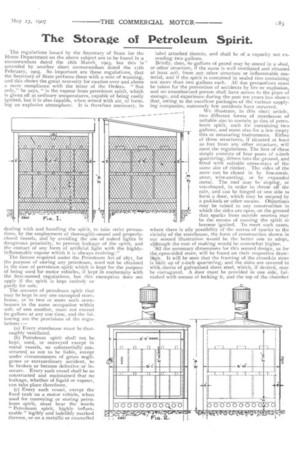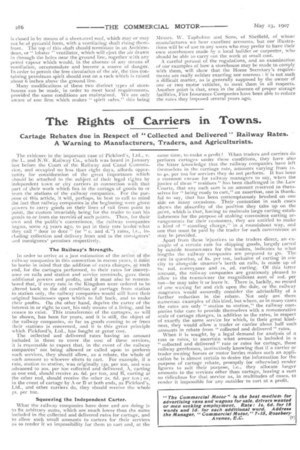The Storage of Petroleum Spirit.
Page 3

Page 4

If you've noticed an error in this article please click here to report it so we can fix it.
The regulations issued by the Secretary of State for the Home Department on the above subject are to be found in a memorandum dated the t8th March 1903, but this is amended by another short memorandum dated the iith February, 1905. So important are these regulations, that the Secretary of State prefaces them with a note of warning, and this shows the great necessity for caution over and above a mere compliance with the letter of the Orders. " Not only," he says, " is the vapour from petroleum spirit, which is given off at ordinary temperatures, capable of being easily ignited, but it is also capable, when mixed with air, of forming an explosive atmosphere. It is therefore necessary, in
deal.ng with and handling the spirit, to take strict precautions, by the employment of thoroughly-sound and properlyclosed vessels, and by avoiding the use of naked lights in dangerous proximity, to prevent leakage of the spirit, and the contact of any form of artificial light with the highlyinflammable vapour which it is always evolving."
The license required under the Petroleum Act of 1871, for the purpose of storing any petroleum, need not be obtained in the case of petroleum spirit which is kept for the purpose of being used for motor vehicles, if kept in conformity with the first-named regulations, but this exemption does not apply if the spirit is kept entirely or partly for sale.
The amount of petroleum spirit that may be kept in any one exempted storehouse, or in two or more such storehouses in the same occupation within 2oft. of one another, must not exceed 6o gallons at any one time, and the following are the provisions of the regulations :— (a) Every storehouse must be thoroughly ventilated.
(b) Petroleum spirit shall not be kept, used, or oonveyed except in metal vessels, so substantially constructed as not to be liable, except under circumstances of gross negligence or extraordinary accident, to be broken or become defective or insecure. Every such vessel shall be so constructed and maintained that no leakage, whether of liquid or vapour, can take place therefrom.
(c) Every such vessel, except the fixed tank on a motor vehicle, when used for conveying or storing petroleum spirit, must bear the words " Petroleum spirit, highly inflammable" legibly and indelibly marked thereon, or on a metallic or enamelled Label attached thereto, and shall be of a capacity not exceeding two gallons.
Briefly, then, 6o gallons of petrol may be stored in a shed, or other structure, if the same is well ventilated and situated at least 2oft. from any other structure or inflammable material, and if the spirit is contained in sealed tins containing not more than two gallons each. All due precautions must be taken for the prevention of accidents by lire or explosion, and no unauthorised person shall have access to the place of storage, and experience during the past ten years has shown that, owing to the excellent packages of the various supplying companies, extremely few accidents have occurred.
We illustrate, in this short article, two different forms of storehouse of suitable size to contain 30 tins Of petroleum spirit, each tin containing two gallons, and room also for a few empty tins or measuring instruments. Either of these structures, if situated at least 20 feet from any other structure, will meet the regulations. The first of these simply consists of four posts of 2-inch quartering, driven into the ground, and fitted with suitable cross-stays of the same size of timber. The sides of the store can be closed in by fine-mesh, stout, wire-netting, or by expanded metal. The roof may be sloping, or yee-shaped, in order to throw off the rain, and can be hinged at one side to form a door, which may be secured by a pad-lock or other means. Objections may be raised to any construction in which the sides are open, on the ground that sparks from outside sources may be the means of causing the spirit to become ignited. To meet such cases, where there is afiy possibility of the access of sparks to the vicinity of the storehouse, the form of construction shown in our second illustration would be the better one to adopt. although the cost of making would be somewhat higher.
All the necessary dimensions for this second design, as for the open-sided store, will be found on their respective drawings. It will be seen that the framing of the closed-in store is built up of 2-inch quartering, and the sides are covered in with sheets of galvanised sheet steel, which, if desired, may be corrugated. A door must be provided in one side, furnished with means of locking it, and the top of the chamber
;•ro
WI
is closed in by means of a sheet-steel roof, which may or may not be of pyramid form, with a ventilating shaft rising therefrom. The top of this shaft should terminate in an Archimedean, or "lobster " ventilator, which will eject the air drawn in through the holes near the ground line, together with any petrol vapour which would, in the absence of any means of ventilation, accummulate and become a source of danger. In order to permit the free circulation of the air, the tins containing petroleum spirit should rest on a rack which is raised about 6 inches above the ground line.
Many modifications of these two distinct types of storehouses can be made, in order to meet local requirements, provided the same conditions are maintained. We are only aware of one firm which makes " spirit safes," this being Messrs. W. Tupholnie and Sons, of Sheffield, of whose manufactures we hear excellent accounts, but our illustrations will be of use to any users who may prefer to have their own storehouses made by a local builder or carpenter, who should be able to carry out the work at small cost. A careful perusal of the regulations, and an examination of our examples of how a storehouse may be made to comply with them, will show that the Home Secretary's requirements are really neither exacting nor onerous : it is not such a difficult matter, as is generally supposed by the owner of one or two motor vehicles, to meet them in all respects. Another point is that, even in the absence of proper storage facilities, Fire Insurance Companies have been able to reduce the rates they imposed several years ago.






























